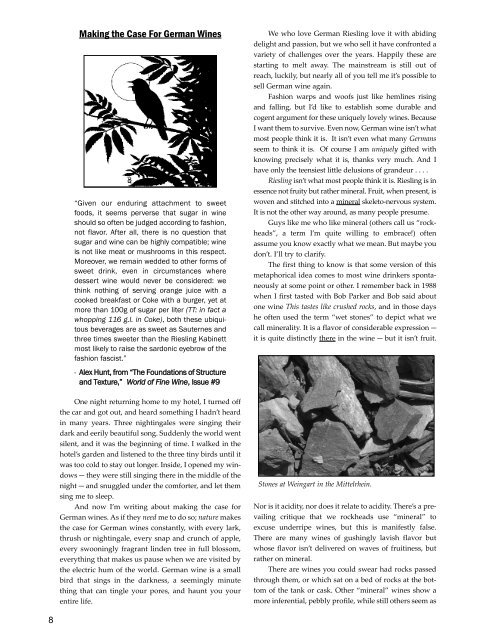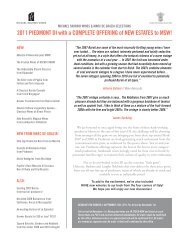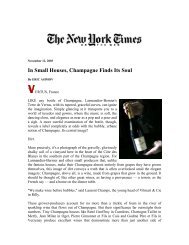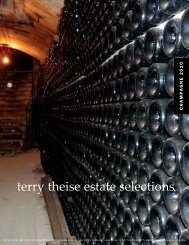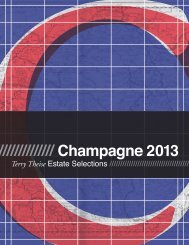German Catalog 2006 USE THIS ONE.qxp - Michael Skurnik Wines
German Catalog 2006 USE THIS ONE.qxp - Michael Skurnik Wines
German Catalog 2006 USE THIS ONE.qxp - Michael Skurnik Wines
Create successful ePaper yourself
Turn your PDF publications into a flip-book with our unique Google optimized e-Paper software.
8<br />
Making the Case For <strong>German</strong> <strong>Wines</strong><br />
“Given our enduring attachment to sweet<br />
foods, it seems perverse that sugar in wine<br />
should so often be judged according to fashion,<br />
not flavor. After all, there is no question that<br />
sugar and wine can be highly compatible; wine<br />
is not like meat or mushrooms in this respect.<br />
Moreover, we remain wedded to other forms of<br />
sweet drink, even in circumstances where<br />
dessert wine would never be considered: we<br />
think nothing of serving orange juice with a<br />
cooked breakfast or Coke with a burger, yet at<br />
more than 100g of sugar per liter (TT: in fact a<br />
whopping 116 g.l. in Coke), both these ubiquitous<br />
beverages are as sweet as Sauternes and<br />
three times sweeter than the Riesling Kabinett<br />
most likely to raise the sardonic eyebrow of the<br />
fashion fascist.”<br />
- Alex Hunt, from “The Foundations of Structure<br />
and Texture,” World of Fine Wine, Issue #9<br />
One night returning home to my hotel, I turned off<br />
the car and got out, and heard something I hadn’t heard<br />
in many years. Three nightingales were singing their<br />
dark and eerily beautiful song. Suddenly the world went<br />
silent, and it was the beginning of time. I walked in the<br />
hotel’s garden and listened to the three tiny birds until it<br />
was too cold to stay out longer. Inside, I opened my windows<br />
— they were still singing there in the middle of the<br />
night — and snuggled under the comforter, and let them<br />
sing me to sleep.<br />
And now I’m writing about making the case for<br />
<strong>German</strong> wines. As if they need me to do so; nature makes<br />
the case for <strong>German</strong> wines constantly, with every lark,<br />
thrush or nightingale, every snap and crunch of apple,<br />
every swooningly fragrant linden tree in full blossom,<br />
everything that makes us pause when we are visited by<br />
the electric hum of the world. <strong>German</strong> wine is a small<br />
bird that sings in the darkness, a seemingly minute<br />
thing that can tingle your pores, and haunt you your<br />
entire life.<br />
We who love <strong>German</strong> Riesling love it with abiding<br />
delight and passion, but we who sell it have confronted a<br />
variety of challenges over the years. Happily these are<br />
starting to melt away. The mainstream is still out of<br />
reach, luckily, but nearly all of you tell me it’s possible to<br />
sell <strong>German</strong> wine again.<br />
Fashion warps and woofs just like hemlines rising<br />
and falling, but I’d like to establish some durable and<br />
cogent argument for these uniquely lovely wines. Because<br />
I want them to survive. Even now, <strong>German</strong> wine isn’t what<br />
most people think it is. It isn’t even what many <strong>German</strong>s<br />
seem to think it is. Of course I am uniquely gifted with<br />
knowing precisely what it is, thanks very much. And I<br />
have only the teensiest little delusions of grandeur . . . .<br />
Riesling isn’t what most people think it is. Riesling is in<br />
essence not fruity but rather mineral. Fruit, when present, is<br />
woven and stitched into a mineral skeleto-nervous system.<br />
It is not the other way around, as many people presume.<br />
Guys like me who like mineral (others call us “rockheads”,<br />
a term I’m quite willing to embrace!) often<br />
assume you know exactly what we mean. But maybe you<br />
don’t. I’ll try to clarify.<br />
The first thing to know is that some version of this<br />
metaphorical idea comes to most wine drinkers spontaneously<br />
at some point or other. I remember back in 1988<br />
when I first tasted with Bob Parker and Bob said about<br />
one wine This tastes like crushed rocks, and in those days<br />
he often used the term “wet stones” to depict what we<br />
call minerality. It is a flavor of considerable expression —<br />
it is quite distinctly there in the wine — but it isn’t fruit.<br />
Stones at Weingart in the Mittelrhein.<br />
Nor is it acidity, nor does it relate to acidity. There’s a prevailing<br />
critique that we rockheads use “mineral” to<br />
excuse underripe wines, but this is manifestly false.<br />
There are many wines of gushingly lavish flavor but<br />
whose flavor isn’t delivered on waves of fruitiness, but<br />
rather on mineral.<br />
There are wines you could swear had rocks passed<br />
through them, or which sat on a bed of rocks at the bottom<br />
of the tank or cask. Other “mineral” wines show a<br />
more inferential, pebbly profile, while still others seem as


